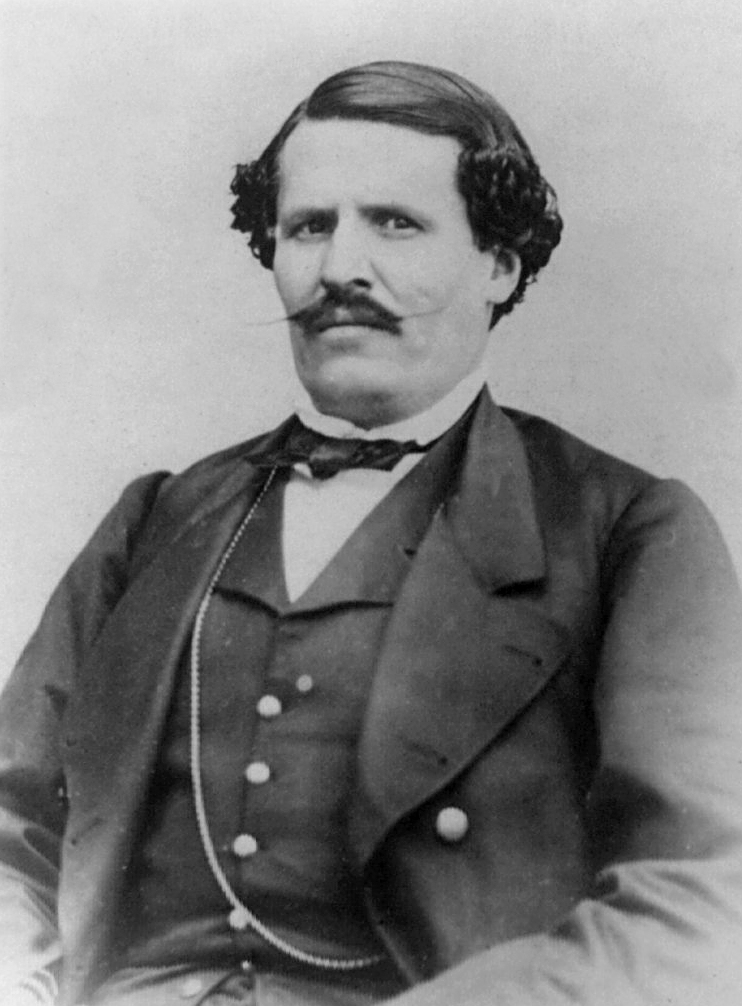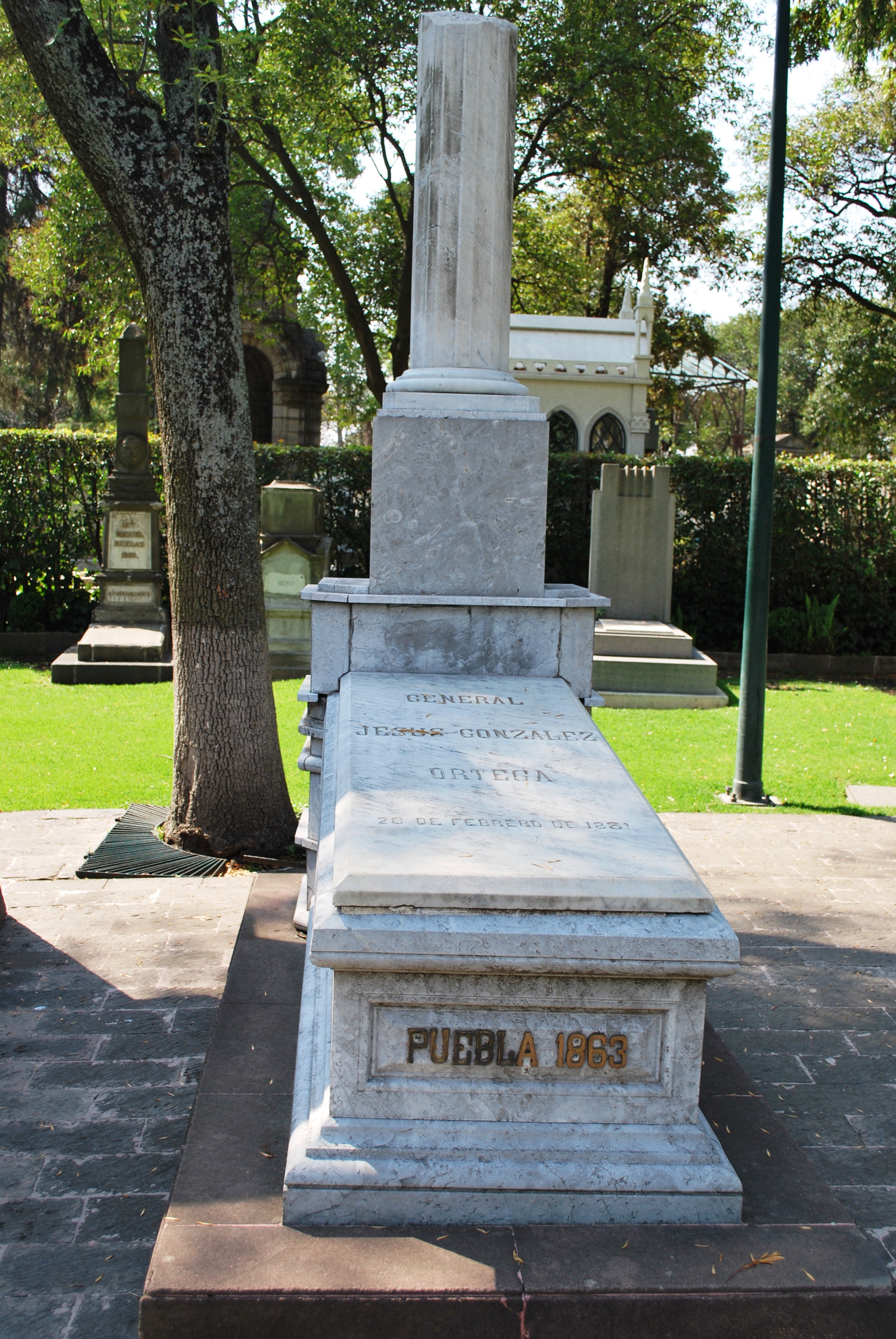Jesús González Ortega on:
[Wikipedia]
[Google]
[Amazon]
 Jesús González Ortega ( Valparaíso, Zacatecas, January 20, 1822 – Saltillo, Coahuila, February 28, 1881) was a Mexican soldier and politician; governor of
Jesús González Ortega ( Valparaíso, Zacatecas, January 20, 1822 – Saltillo, Coahuila, February 28, 1881) was a Mexican soldier and politician; governor of
 Although González Ortega was not a career soldier, he was head of the army of President Juarez in 1860 and lead them to victory in the decisive battle of Calpulalpan. In March 1861, he was appointed Minister of War, but due to differences with some cabinet members, he resigned but remained in command of the division of Zacatecas. On August 8, 1861, the Battle of San Felipe del Obraje took place under his command. Following the 1861 murders of Melchor Ocampo, Santos Degollado and Leandro Valle, he returned to
Although González Ortega was not a career soldier, he was head of the army of President Juarez in 1860 and lead them to victory in the decisive battle of Calpulalpan. In March 1861, he was appointed Minister of War, but due to differences with some cabinet members, he resigned but remained in command of the division of Zacatecas. On August 8, 1861, the Battle of San Felipe del Obraje took place under his command. Following the 1861 murders of Melchor Ocampo, Santos Degollado and Leandro Valle, he returned to
 Jesús González Ortega ( Valparaíso, Zacatecas, January 20, 1822 – Saltillo, Coahuila, February 28, 1881) was a Mexican soldier and politician; governor of
Jesús González Ortega ( Valparaíso, Zacatecas, January 20, 1822 – Saltillo, Coahuila, February 28, 1881) was a Mexican soldier and politician; governor of Zacatecas
Zacatecas, officially the Free and Sovereign State of Zacatecas, is one of the Political divisions of Mexico, 31 states of Mexico. It is divided into Municipalities of Zacatecas, 58 municipalities and its capital city is Zacatecas City, Zacatec ...
who was a notable ally of President Benito Juárez during the War of Reform and during the French intervention in Mexico. He is notable for defending the city of Puebla
Puebla, officially the Free and Sovereign State of Puebla, is one of the 31 states that, along with Mexico City, comprise the Federal Entities of Mexico. It is divided into 217 municipalities and its capital is Puebla City. Part of east-centr ...
from the French army March 16, 1863, to May 16, 1863.
During the French Intervention he had a falling out with Juarez, due to the fact that in 1865, the presidency was constitutionally supposed to pass to Gonzales Ortega, but Juarez held on to power due to the extraordinary circumstances, a situation that was accepted by most of the liberal party. He continued to champion his claim to the presidency, leading to his arrest in 1867 and shortly afterward, his supporter José María Patoni was kidnapped and murdered by General Benigno Canto, leading to rumors and an allegation from Canto himself that he was acting upon orders from Minister of War Ignacio Mejía, an accusation which the government vehemently denied. González Ortega gave up his claim, was pardoned the year afterward and no longer played any role in public life. He died in 1881.
Early life
Ortega was born on January 20, 1822, in San Mateo, in Valparaíso,Zacatecas
Zacatecas, officially the Free and Sovereign State of Zacatecas, is one of the Political divisions of Mexico, 31 states of Mexico. It is divided into Municipalities of Zacatecas, 58 municipalities and its capital city is Zacatecas City, Zacatec ...
, he moved his residence to the city of Guadalajara
Guadalajara ( ; ) is the capital and the most populous city in the western Mexican List of states of Mexico, state of Jalisco, as well as the most densely populated municipality in Jalisco. According to the 2020 census, the city has a population ...
, Jalisco
Jalisco, officially the Free and Sovereign State of Jalisco, is one of the 31 states which, along with Mexico City, comprise the 32 Political divisions of Mexico, Federal Entities of Mexico. It is located in western Mexico and is bordered by s ...
, where he began his law studies, and for family reasons could not conclude. While still very young, he came to the town of San Juan Bautista of Teúl (today Teúl Gonzalez Ortega), where he served as a clerk at City Hall. Since his youth he was a fervent supporter of the Liberal Party.
During the controversies over the anti-clerical clauses of the Constitution of 1857, Gonzales Ortega as governor of Zacatecas in 1859, passed severe decrees aimed at any priest agitating against the Constitution, prescribing the death penalty for acts including denying the sacraments to those Catholics that had taken the oath of fealty to the constitution. The death penalty was even applied to laymen who agreed to serve as witnesses for those who wished to prove that they had retracted their oaths to the constitution.
Military career
Mexico City
Mexico City is the capital city, capital and List of cities in Mexico, largest city of Mexico, as well as the List of North American cities by population, most populous city in North America. It is one of the most important cultural and finan ...
and was appointed president of the Supreme Court of the Nation, a position that placed the holder as successor to the president of the republic.
French intervention to Mexico
When the French army invadedMexico
Mexico, officially the United Mexican States, is a country in North America. It is the northernmost country in Latin America, and borders the United States to the north, and Guatemala and Belize to the southeast; while having maritime boundar ...
, the Eastern Army was in charge of General Ignacio Zaragoza, who defended the city of Puebla
Puebla, officially the Free and Sovereign State of Puebla, is one of the 31 states that, along with Mexico City, comprise the Federal Entities of Mexico. It is divided into 217 municipalities and its capital is Puebla City. Part of east-centr ...
on May 5, 1862, González Ortega arrived in the city a day later. On the death of General Zaragoza, Jesús González Ortega was appointed by President Benito Juarez Benito may refer to:
Places
* Benito, Kentucky, United States
* Benito, Manitoba, Canada
* Benito River, a river in Equatorial Guinea
Other uses
* Benito (name)
** Benito Mussolini
Benito Amilcare Andrea Mussolini (29 July 188328 April 1 ...
chief of the Eastern Army and laid siege to the remnants of the recently defeated French army at Orizaba. However, at the Battle of Cerro del Borrego, his army was routed and forced to retreat. He was instructed to defend the city of Puebla from the French army, now commanded by General Élie-Frédéric Forey again. On March 16, 1863, the French expeditionary army besieged the city, took place a battle that also generated heavy losses for both sides, the battle lasted two months, was on May 16 of that year when the Mexican army had no weapons or ammunition and their strength was sharply reduced by the harsh battle, General Ortega ordered his army to surrender and later disperse giving up the capital in the process.
In 1864, while the war was ongoing, Ortega put forth a claim to the presidency, arguing that since Juarez' term expired, and no election could be held at the moment to replace him, the presidency, according to the constitution, must pass to Ortega who was president of the Supreme Court. It was pointed out to him, that the constitutional clause did not come into effect until the following year upon which Ortega left Mexico for the United States. The claim was once again brought up when Juarez' term did expire in 1865, but as González Ortega had not been in the country for a long time, his claim was declared forfeited. González Ortega defended himself, and published an official letter from December 1864 in which he had been given permission to leave his post indefinitely, as long as he continued to help the war effort. He claimed that he had, and that the government of Juarez had ignored his letter asking for permission to recruit volunteers, and that he was currently entangled in a lawsuit in the United States. He also argued that there had been a previous conspiracy to discredit his military prestige, by having placed him in critical positions without sufficient forces. In the dispute, for practical reasons, most liberals supported Juarez, though González Ortega's candidacy gained support from General José María Patoni and Guillermo Prieto. As the Second Mexican Empire collapsed in 1866, the departing French urged Maximilian to abdicate, and considered forming a new republican government, friendly to France and led by González Ortega. The United States however preferred to continue recognizing Juarez as more agreeable to American influence. In November, González Ortega was arrested by American authorities in Texas, as an opponent to the recognized government of Mexico.
Ortega returned to Mexico and arrived in Zacatecas on January 8, 1867, accompanied by General Patoni. He announced himself to Governor Anza and Secretary of State Marquez was sent to Gonzales Ortega to inquire on the purpose of his visit. Gonzales Ortega still upheld his claim to the presidency and asked for a conference with the governor. The conference was granted at which Anza arrested Ortega and Patoni and sent them to Juarez who had them arrested until he felt they were no longer a threat. General Patoni was murdered on August 18, 1868, by officers of the 1st brigade of the 4th division commanded by General Ramón Corona. There was national outrage, and rumors of a government conspiracy, but the government denied any role in the incident, and the perpetrator General Benigno Canto was brought to trial and sentenced on February 2, 1873, to ten years imprisonment.
Retirement
Ortega would play no crucial role in the war and would be put on the sidelines after the republicans eventually won. In early 1881, he received a letter of recognition from President Manuel González Flores, and shortly after he died at his residence on January 28. His remains were interred in April at the Rotunda of Illustrious Persons.References
{{DEFAULTSORT:Gonzalez Ortega, Jesus Governors of Zacatecas Governors of Puebla Secretaries of defense of Mexico Mexican generals 1822 births 1881 deaths People from Zacatecas Liberalism in Mexico People of the Second French intervention in Mexico Burials at the Panteón de Dolores